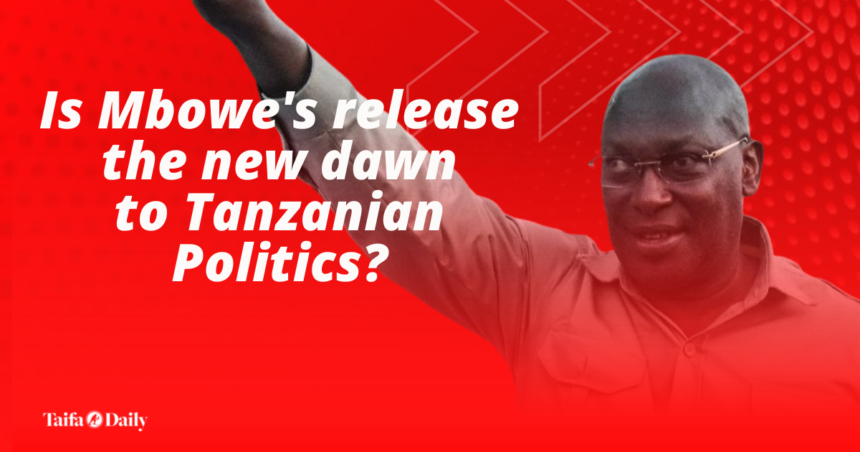At the High Court Division of Corruption and Economic Sabotage Offences in Dar es Salaam on March 4, 2022, Freeman Mbowe and three co-accused were declared freemen after spending nearly a year in custody on terror-related charges.
The news took social media by storm, with pictures and videos of Mbowe’s loyalists seeing dancing, singing and jumping with bliss following the court’s rule. Mr Peter Kibatala, Mbowe’s lead lawyer, welcomed his client’s victory with great charm, adding that “no stone was left unturned”.
Mbowe’s release unfolded two days after a beseech of his release from various clerics to President Samia during a meeting hosted at the State House in Dar es Salaam. It also came after an unprecedented meet-up of President Samia and CHADEMA Deputy Chair Mr Tundu Lissu in Belgium, where Lissu confirmed later to have had presented plead of Mbowe’s release.
There have been floods of opinions online on whether Mbowe’s release in the new dawn to Tanzanian politics. Analysts say this could be signing that the government could lose that grip for oppositions to operate freely, or oppositions in Tanzania shall keep running in the vacuum-like it was in the past six years.
Bishop Bagonza, a staunch clergyman, released an article soon after Mbowe’s release, an article with a title that reads, “Mbowe is out of prison, but not free.” citing that as long as the law that subdued Mbowe still functioning, then not only Mbowe, but none of us is free.
Since President Samia took office almost a year ago, she has been taking a series of multiple and considerable steps in what she called ‘healing the nation’, including dialogues with pro-democracy stakeholders, lifting the ban of newspapers and other media outlets, her effort to improve the civic space in Tanzania.
Mbowe’s visit at the State House
A few hours later, before people got away with the hangover of Mbowe’s release, they were stunned by a picture of him and President Hassan at Magogoni State House in Dar es Salaam.
Speaking before State House’s press, with humility, with clasped hands, Mr Mbowe said, “We need civilized politics to help the government perform its task and for the government to ensure we have the space for doing our job, democracy to flourish in our country, and people to be happy, something that the President has started doing. We have a guarantee from the President, and we are ready to cooperate with her”, Said Freeman Mbowe in his usual calm tone.
The release of Mr Mbowe comes after a spate of vindication of more than 50 people in the country wrongly convicted for charges of terrorism, and economic sabotages, a move that analysts say will improve Samia’s political capital.
A new dawn to Tanzanian politics?
Mbowe’s release could be the new dawn to Tanzanian politics. His release could be a gateway from the gruesome political experience Tanzania had gone through in the last six years. Zitto Zuber Kabwe, a prominent oppositional leader, serving as the ACT party leader and a chair for a non-partisan organization, Tanzania Center of Democracy (TCD), said Mbowe’s release was one of the TCD’s key focus areas.
TCD leadership structure is a conflate of CCM, CHADEMA, CUF, NCCR – Mageuzi and ACT Wazalendo leaders.
Zitto seems to have high hopes that democracy shall thrive in Tanzania under the leadership of President Samia Suluhu Hassan, considering that she took part at the symposium to moot the status of multiparty democracy in Tanzania in Dodoma December in 2021.
Speaking before Press, Zitto highlighted the upcoming conference on Justice, Peace and Reconciliation scheduled to take place between March 30 and 31, 2022, in Dodoma under the auspices of TCD, where unconfirmed reports say President Samia will grace the gathering.
“I believe that through TCD and other important stakeholders, Tanzania will return to becoming a nation of optimism, and that takes great developmental strides without affecting the political and civil liberties of its people,” Zitto said.
Mbowe’s release seems to have opened doors to further discussion on National Elections Act, Political Parties Act and New Constitution that seem constrained by the state. Zitto said two bills are at hand already, thanks to the Legal and Human Rights Centre (LHRC) for their legal assistance on their development, Zitto Said.
Zitto said he hopes if the two bills (National Elections Act & Political Parties Act) successfully turn into laws, they will undoubtedly ensure free and fair elections in Tanzania, which will be a significant development to Tanzanian politics.


